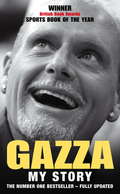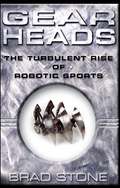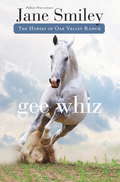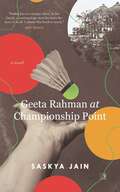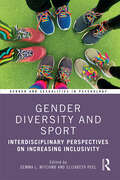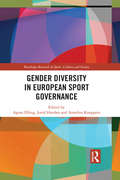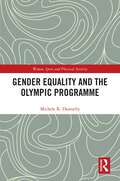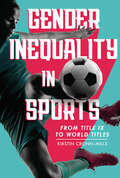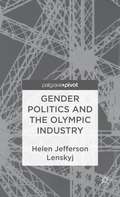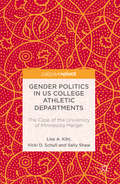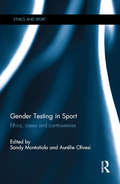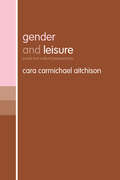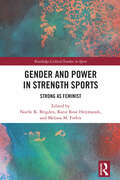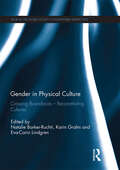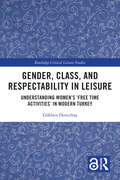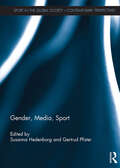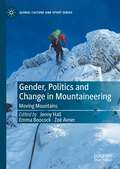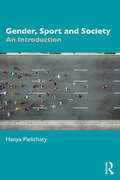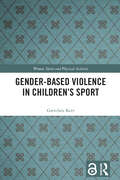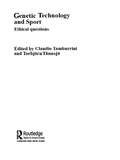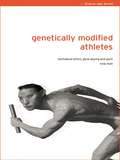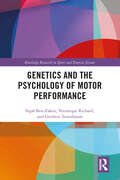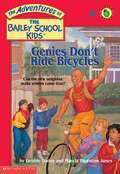- Table View
- List View
Gazza: My Story
by Paul GascoigneAlmost as soon as Gazza burst on to the scene at Newcastle United, the young Geordie was the centre of attention: Vinnie Jones's notorious ball-handling showed the lengths people would go to try to stop him. Then, with England on the verge of possibly reaching the World Cup final in 1990, came Gazza's tears - the moment that brought a whole new audience to the sport and helped set the football boom of the 1990s on its way. But then came a career-threatening injury, mental health problems, self-confessed alcoholism and family disputes, as life in the full glare of the media spotlight became too much. Now, at the end of his top-flight playing career, Gazza is ready to confront his demons. The result is quite simply the most remarkable footballing story you'll ever read: what it's like being Paul Gascoigne, in his own words.
Gazza: My Story
by Paul GascoigneAlmost as soon as Gazza burst on to the scene at Newcastle United, the young Geordie was the centre of attention: Vinnie Jones's notorious ball-handling showed the lengths people would go to try to stop him. Then, with England on the verge of possibly reaching the World Cup final in 1990, came Gazza's tears - the moment that brought a whole new audience to the sport and helped set the football boom of the 1990s on its way. But then came a career-threatening injury, mental health problems, self-confessed alcoholism and family disputes, as life in the full glare of the media spotlight became too much. Now, at the end of his top-flight playing career, Gazza is ready to confront his demons. The result is quite simply the most remarkable footballing story you'll ever read: what it's like being Paul Gascoigne, in his own words.
Gear Heads: The Turbulent Rise of Robotic Sports
by Brad StoneIn the early nineties, a visionary special-effects guru named Marc Thorpe conjured a field of dreams different from any the world had seen before: It would be framed by unbreakable plastic instead of cornstalks; populated not by ghostly ballplayers but by remote-controlled robots, armed to the steely teeth, fighting in a booby-trapped ring. If you built it, they'd come all right. In Gearheads, Newsweek technology correspondent Brad Stone examines the history of robotic sports, from their cultish early years at universities and sci-fi conventions to today's televised extravaganzas -- and the turmoil that threatened the whole enterprise almost from the beginning. By turns a lively historical narrative, a legal thriller, and an exploration of a cultural and technological phenomenon, Gearheads is a funny and fascinating look at the sport of the future today.
Gee Whiz
by Jane SmileyGee Whiz is a striking horse, and only part of that is because of his size. He is tall, but also graceful, yet his strides big but precise. At the same time, he keeps his eye on things, not as if he's suspicious, but as if he's curious.When Abby is confronted with an onslaught of reminders of just how little of the world she has seen, she finds herself connecting with Gee Whiz's calm and curious nature, and his desire to know more. Her brother receives a draft notice to Vietnam, her friends return for the holidays with stories from their boarding school in Southern California, and the wise, lovable Brother Abner opens her eyes with tales of his many years spent traveling. At the same time, her beloved Jack and True Blue are both faced with opportunites to broaden their horizons away from the ranch. Will she let them go, with hopes that she might one day do the same?
Geeta Rahman at Championship Point
by Saskya JainA young girl's fight to live her dream in a country trying to break free from its past.It's 1993 in New Delhi, the Babri Masjid demolition has just happened, and India is on the verge of opening its economy to the world. Growing up in this new, fast-changing India, Geeta is caught between her great wish — to become India's biggest badminton star — and the grief she is experiencing along with her father. Geeta Rahman at Championship Point is the story of twelve-year-old Geeta Rahman, a badminton prodigy on one hand and an aspiring servant of the Government of India on the other, she is also trying to come to terms with the recent death of her mother.In this moving and distinctively original novel, Saskya Jain brilliantly weaves the personal and the political — as Geeta&’s life within her tightly-knit community unfolds, the story of a liberalized India desperate to channel its newfound ambitions to finally silence the ghosts of Partition also comes to the fore. The answer to whether or not Geeta succeeds, and at what price, is tied to this constantly changing landscape. By using the game of badminton as a metaphor, Jain&’s inventive prose establishes a strong sense of place and meticulously explores the sense of a young girl&’s unique mindset, presenting us with an unforgettable narrator learning to find her place under the sun.
Gender Diversity and Sport: Interdisciplinary Perspectives (Gender and Sexualities in Psychology)
by Gemma L. WitcombThis timely and urgent text presents cutting-edge research exploring the complexities of barriers to inclusive access to sport and physical activity, and discusses how sport, and society, can move forward beyond the gender binary, in both theory and practice. Sport is one of the most influential, powerful, and visible institutions upholding the gender binary, even as the number of people identifying as transgender and non-binary increases rapidly worldwide. With this rising visibility, societal pressure has been increasing for the equal acceptance of gender diverse people, but while gains have been made in many areas, the participation of intersex, trans and non-binary people in sport remains harshly contested. Bringing together a world-leading team of established and emerging scholars from the UK, USA, and Australia, this collection presents an interdisciplinary analysis of current issues related to the participation of gender diverse individuals in sport and physical activity. Engaging with psychological ideas around identity, prejudice and discrimination, and sports psychology and performance, authors examine evidence that the rules, regulations, and practices that surround physical activity participation – from elite sport to sport in schools, universities, and society at large – are grounded in heteronormative, cisgendered, and sexist practices which unfairly discriminate against gender diverse people. Also including analysis of personal accounts from non-binary and transgender athletes from a range of sports, this is fascinating and essential reading for education, health, and sports professionals who work with and support gender diverse children and adults, as well as academics and students in the fields of psychology, sport psychology, sociology, law, and sports science, and those participating in, and navigating, sport and physical activity spaces.
Gender Diversity in European Sport Governance (Routledge Research in Sport, Culture and Society)
by Agnes Elling Jorid Hovden Annelies KnoppersGender equality is one of the founding democratic principles of the EU. However, recent studies of the Federation of Olympic Sports in Europe have shown that women occupy only fourteen percent of decision-making positions in sport organizations. This book presents a comprehensive and comparative study of how various regions and countries of Europe have addressed this lack of gender diversity, discussing which strategies have brought about change and to what extent these changes have been successful. With contributions from leading sport sociologists, covering countries such as Germany, Hungary, Norway, Poland, Spain, Turkey and the UK, it provides a foundation for future policymaking, methodological analyses and theoretical developments that can result in sustainable gender equality in European sport governance. Gender Diversity in European Sport Governance is important reading for scholars and students in the fields of sociology of sport, sport management, sociology, gender studies and studies of organization, management and leadership. It is also a valuable resource for policy makers in the EU, as well as national sport organizations and activists.
Gender Equality and the Olympic Programme (Women, Sport and Physical Activity)
by Michele K. DonnellyThis innovative study examines the Olympic programme from a critical feminist perspective, to shed new light on the issues of gender and inclusion at the Olympic Games and in the Olympic Movement. Incorporating both quantitative and qualitative data, the book identifies and analyzes the changes – and remaining gender differences – made on the Olympic Programmes for London 2012, and each of the subsequent Summer and Winter Olympic Games (Sochi 2014, Rio 2016, and Pyeongchang 2018), as well as the Tokyo 2020 and Beijing 2022 Games. The book draws on the IOC&’s own publications, information from International and National Sport Federations, and media sources to describe and explain the IOC&’s slow and uneven progress toward gender equality at the Olympic Games. This is important reading for any student, researcher, practitioner or policy maker with an interest in the Olympic Games, sport studies, gender studies, women&’s sport or major events.
Gender Inequality in Sports: From Title IX to World Titles
by Kirstin Cronn-Mills“We trained just as hard and we have just as much love for our sport. We deserve to play just as much as any other athlete. . . . I am sick and tired of being treated like I am second rate. I plan on standing up for what is right and fighting for equality.” —Sage Ohlensehlen, Women’s Swim Team Captain at the University of Iowa Fifty years ago, US president Richard Nixon signed Title IX into law, making it illegal for federally funded education programs to discriminate based on sex. The law set into motion a massive boom in girls and women’s sports teams, from kindergarten to the collegiate level. Professional women’s sports grew in turn. Title IX became a massive touchstone in the fight for gender equality. So why do girls and women—including trans and intersex women—continue to face sexist attitudes and unfair rules and regulations in sports? The truth is that the road to equality in sports has been anything but straightforward, and there is still a long way to go. Schools, universities, and professional organizations continue to struggle with addressing unequal pay, discrimination, and sexism in their sports programming. Delve into the history and impact of Title IX, learn more about the athletes at the forefront of the struggle, and explore how additional changes could lead to equality in sports. “Girls are socialized to know . . . that gender roles are already set. Men run the world. Men have the power. Men make the decisions. . . . When these girls are coming out, who are they looking up to telling them that’s not the way it has to be? And where better to do that than in sports?” —Muffet McGraw, Head Women’s Basketball Coach at Notre Dame “Fighting for equal rights and equal opportunities entails risk. It demands you put yourself in harm’s way by calling out injustice when it occurs. Sometimes it’s big things, like a boss making overtly sexist remarks or asserting they won’t hire women. But far more often, it’s little, seemingly innocuous, things . . . that sideline the women whose work you depend on every day. You can use your privilege to help those who don’t have it. It’s really as simple as that.” —Liz Elting, women’s rights advocate
Gender Politics and the Olympic Industry
by Helen Jefferson LenskyjThis book explores how the Olympic industry has shaped hegemonic concepts of sporting masculinities and femininities for its own profit and image-making ends, examining its continuing marginalization of athletes on account of their race, ethnicity, gender, sexuality and class.
Gender Politics in US College Athletic Departments
by Lisa A. Kihl Vicki D. Schull Sally ShawThis book examines the gendered politics in the context of a merger of the women's and men's athletic departments at the University of Minnesota over a ten year plus span. Examining the athletic department merger helps us understand women's continual under-representation in University athletics despite Title IX legislation passing 40 years ago. Using interview with organizational stakeholders and archival document data, the book explores how organizational change in the form of a merger is gendered with relation to the premerger, merged, post-merger stages.
Gender Testing in Sport: Ethics, cases and controversies (Ethics and Sport)
by Sandy Montanola Aurélie OlivesiAfter the young South African athlete Caster Semenya won the 800m title at the 2009 World Championships she was obliged to undergo gender testing and was temporarily withdrawn from international competition. The way that this controversy unfolded represents a rich and multi-layered example of the construction of gender in wider society and the interrelationships between sport, culture and the media. This is the first book to explore the case in depth, from socio-cultural, ethical and legal perspectives. Analysing what came to be called "the Caster Semenya Case" in a comprehensive and multi-disciplinary fashion, and covering issues from media discourses and the rhetoric and regulations of the sport’s governing bodies to the reaction of the athlete herself, the book explores the ethics of how gender norms in sport, and in society more generally, are constructed through appearance, behaviour and sporting performance. This 2009 controversy can be taken as an indicator of the tensions of the time, and served as a link between medical sciences, society and gender. Including discussions of key concepts such as 'intersex', 'body norms', and 'fairness', Gender Testing in Sport is fascinating and important reading for anybody with an interest in sport studies, gender studies or biomedical ethics.
Gender and Leisure: Social and Cultural Perspectives (Contemporary Geographies Of Leisure, Tourism And Mobility Ser.)
by Cara Carmichael AitchisonThe highly contested nature of both 'gender' and 'leisure' encapsulates many of the most critical social and cultural debates of the early twenty-first century. Drawing on a wide range of theoretical perspectives, as well as extensive empirical research, Gender and Leisure goes forward to offer a contemporary socio-cultural analysis of gender relations in leisure practice and leisure policy. The book begins by introducing and evaluating the key social and cultural ideologies, philosophies and beliefs that have informed our theoretical understanding of gender and leisure. The particular leisure policies that have emerged from these perspectives are examined. Part two of Gender and Leisure draws on research in social and cultural theory, gender and leisure studies, cultural geography, management and education, and goes on to explore the reality of contemporary gender relations in leisure practice. Leisure policy, leisure management, places and sites of leisure and leisure education are examined, as are the relationships between leisure, sport and tourism.
Gender and Physical Education: Contemporary Issues and Future Directions
by Dawn PenneyGender and Physical Education offers a critical and comprehensive commentary on issues relating to gender in PE and teacher education. The book challenges our understandings of gender, equity and identity in PE, establishing a conceptual and historical foundation for the issue, as well as presenting a wealth of original research material. The book delivers a critical analysis of the progress and shortcomings pf contemporary policies and practice in PE as they relate to gender, and reflects on the similarities and differences between developments in the UK, US and Australia. It also offers a new framework for research, policy and practice with a view to advancing gender equity, and addresses the roles that teachers, educators and policy makers can play in challenging existing inequalities. Gender and Physical Education is important reading for students and lecturers in education, teacher educators and providers of continuing professional development in PE, and anybody concerned with gender issues in education, PE or sport.
Gender and Power in Strength Sports: Strong As Feminist (Routledge Critical Studies in Sport)
by Katie Rose Hejtmanek Noelle K. Brigden Melissa M. ForbisThis book explores strength sports as a site of political contestation and a platform for insurgent gender practices. It contributes to our understanding of key themes in the study of sport, such as feminism, power, the body and identity. Drawing together interdisciplinary work spanning political science, sociology, gender studies, and biological and cultural anthropology, the book argues that in the face of ongoing embodied precarity, strength sports have become a complex form of both resistance to, and reproduction of, patriarchy. This argument also challenges traditional understandings and definitions of “strength.” Covering recreational-level participation and elite athletics, across experiential/individual, local, national, transnational, and global scales, the book explores diverse topics such as the pregnant strength athlete, the status of trans women in strength sports, and the gendered dimensions of online fitness communities during the COVID-19 pandemic. In so doing, it traces power dynamics and the interplay among multiple oppressions. Showcasing important empirical and activist research, this book is fascinating reading for anybody with an interest in women’s sport, women’s studies, gender studies, the sociology of sport, strength and conditioning, feminist politics, or cultural studies.
Gender in Physical Culture: Crossing Boundaries - Reconstituting Cultures (Sport in the Global Society – Contemporary Perspectives)
by Karin Grahn Natalie Barker–Ruchti Eva–Carin LindgrenThis volume outlines existing research relating to gender in physical culture. The introductory chapter employs Lamont and Molnàr’s (2002) idea of ‘boundaries’ as visible and invisible socially constructed borders that create social differences, as the theoretical framework for the book. Seven empirically-driven case studies follow which, on the one hand, demonstrate how boundary ‘work’ has taken and is taking place at the level of media, institutions, communities and individuals; and on the other hand, show how individuals, groups of individuals and organisations challenge and change dominant gender discourses and practices. The wide variety of rich case materials reveal how gender ideals not only normalize, but are actively and purposefully negotiated and transformed to create individualised and inclusive physical culture contexts. The final chapter explores how the book builds on and extends existing gender and physical culture research.This book was originally published as a special issue of the journal Sport in Society.
Gender, Class, and Respectability in Leisure: Understanding Women’s ‘Free Time Activities’ in Modern Turkey (Routledge Critical Leisure Studies)
by Gökben DemirbaşThis book interrogates the role of gender and class in shaping women’s everyday leisure practices. Drawing on empirical research in urban Turkey, the book explores how leisure is perceived and practised by women within their communities.The book examines the relationship of women’s leisure to their labour, women’s access to and uses of public leisure spaces, and the dynamics of their everyday sociability within their neighbourhoods. It is the first book to apply Skegg’s concept of ‘respectability’ – socially recognised judgments and standards which label the ‘right’ practices, that hold morality and power in a given context – as a theoretical tool with which to understand leisure in a country in which modernisation and Westernisation have been a central dynamic shaping political, social, and cultural life. This analysis reveals that two measures of gendered respectability – reproductive work and the honour code – and how they mediate with the classed measures of respectability, are essential to understanding women’s leisure practices in the Turkish context. The book argues that these interactions are likely shared in many Global South countries, including Islamic societies. Therefore, this analysis shines important new light on women’s experiences more broadly, and on the social, political, and cultural dynamics of traditional social structures in a modernising world.This book is fascinating reading for anybody with an interest in leisure studies, women’s studies, sociology, cultural studies, or Middle East studies.
Gender, Media, Sport (Sport in the Global Society – Contemporary Perspectives)
by Susanna Hedenborg and Gertrud PfisterDespite the position that sport occupies at the centre of public attention, and despite the billions of consumers and immense coverage which it attracts from around the globe, it seems that the media prioritise coverage of only a very small fraction of sporting events, and a few prominent athletes. It goes without saying that sport in the media is dominated by men – they are a large majority among athletes, consumers, journalists, and producers. This book will shed new light on the long discussed question of gendered sporting coverage, in an era when the Olympics can be dubbed the ‘women’s games’. Some of the contributions present new perspectives such as: the relationship between media and sport in Poland; media presentations of men and women in gender ‘adequate’ and ‘inadequate’ sports; competition between women and men participating in the same events; the presentation of celebrities; and the framing of doping within the context of gender relations. Furthermore, the book focuses not only on athletes, sports and events, but also on consumers, such as hooligans and their brand of masculinity, and on journalists, such as Mike Penner, who attempted to transgress gender boundaries. This book was originally published as a special issue of Sport in Society.
Gender, Politics and Change in Mountaineering: Moving Mountains (Global Culture and Sport Series)
by Jenny Hall Emma Boocock Zoë AvnerThis book is the first edited collection to offer an intersectional account of gender in mountaineering adventure sports and leisure. It provides original theoretical, methodological, and empirical insights into mountain spaces as sites of socio-cultural production and transformation. The book shows how gender matters in the twenty-first century, and illustrates that there is a need for greater efforts to mainstream difference in representations and governance structures if we are to improve equality in adventure, sporting and leisure spaces. The interdisciplinary volume represents scholars from theoretical as well as applied perspectives across adventure, tourism, sport science, sports coaching, psychology, geography, sociology and outdoor studies.
Gender, Sport and Society: An Introduction
by Hanya PielichatyIntroducing the core concepts, issues and debates in the study of gender and sport, this is an accessible, engaging and thought-provoking textbook for anyone studying or interested in sport. It highlights the complexity of the gendered sporting world. Exploring inequalities in society that are reflected in sporting spaces and practices, and offering practical guidance on how to develop study skills and critical thinking, this textbook empowers readers to view the world in a different way. The book explores the social and political aspects of gender, sport and society, as well as their intersection with race/ethnicity, dis/ability, and sexualities. Introducing the basics of gender theory as applied to sport, and placing equity, diversity and inclusion at the heart of the discussion, the book explores key themes, current issues and hot topics, such as women in esports, mental health, and parenthood. The book also looks at how gender and gender stereotypes play out in the world of sport business and management. The reader is asked to co-create the textbook’s narrative by engaging with several pedagogical features, such as ‘stop and think’ and seminar activities, requesting the reader to be an active and critical participant. The compact and considered chapters will help to break down the complexity involved in this subject area. The final chapter is dedicated to study skills and practical learning advice, acting as a study guide to complement the discipline-rich chapters that come before it. This textbook is written from practitioner-educator experience ensuring the content is degree-specific, critically positioned, and most importantly, inclusive and accessible. Full of useful features in every chapter, from subject ‘insights’ to guides on further reading, media links and other sources, as well as example assignment questions, this is an indispensable textbook for all students of gender and sport, women and sport, the sporting body, sport and society, social issues in sport, inclusion in sport, and sport development, and fascinating reading for anyone with an interest in sport, gender studies or sociology more broadly.
Gender-Based Violence in Children’s Sport (Women, Sport and Physical Activity)
by Gretchen KerrThis book addresses the major forms of Gender-Based Violence (GBV) in children’s sport, including sexual, physical, and psychological violence and neglect. It reviews the historical, sociocultural, and political influences on violence towards children, and sets out future agendas for research and practice to eliminate GBV in sport. The book argues that for GBV to occur and be sustained over time, it must be facilitated by a system that enables this violence, protects the perpetrator, disables bystanders, silences the victims, and/or fails to provide a structure by which to address victims’ or bystanders’ concerns. Drawing on empirical research from across a range of disciplines, including sport sociology, sport psychology, developmental psychology, and coaching, and examining real life case studies of GBV in sport at all levels, the book makes a powerful case for radical change in our current systems of sport governance, safeguarding, and athlete welfare. This is important reading for any student, researcher, policy-maker, coach, welfare officer or counsellor with an interest in sport, gender studies, safeguarding, criminology, or sociology. An electronic version of this book is freely available, thanks to the support of libraries working with Knowledge Unlatched (KU). KU is a collaborative initiative designed to make high quality books Open Access for the public good. The Open Access ISBN for this book is 9781003035138. More information about the initiative and links to the Open Access version can be found at www.knowledgeunlatched.org.
Genetic Technology and Sport: Ethical Questions (Ethics and Sport)
by Torbjörn Tännsjö Claudio TamburriniWill the genetic design of athletes destroy sport … or will it lead to a new and extraordinary age of athletic achievement? Exploring a new territory in sport and ethics, this edited collection contains some of the best new writing that has emerged from the debates concerning the uses of genetic technologies to improve sport performance. Issues covered include: * gene technology and sports ethics* genetic testing in sports* gene technology and the sporting ethos* gene technology and gender equality in sport. This cutting-edge text is the first on the subject to analyze gender specific questions that arise from genetically modified sport and is likely to provoke further debate in the world of sport and bio-ethics. Contributors include Lincoln Allison, Ruth Chadwick, Arne Ljungqvist, Andy Miah, Christian Munthe, Bengt Saltin, Angela Schnieder and many more.
Genetically Modified Athletes: Biomedical Ethics, Gene Doping and Sport (Ethics and Sport)
by Andy MiahIn a provocative analysis of sport ethics and human values, Genetically Modified Athletes imagines the brave new world of sport. The internationally acclaimed book examines this issue at a crucial time in its theorisation, questioning the very cornerstone of sporting and medical ethics, asking whether sporting authorities can, or even should, protect sport from genetic modification. This book brings together sport studies and bioethics to challenge our understanding of the values that define sport. We already allow that athletes can optimise their performance by the use of technologies; without wishing to assert that 'anything goes' in sports performance enhancement, Andy Miah argues that simply being human matters in sport and that genetic modification does not have to challenge this capacity. Genetically Modifies Athletes includes examination of: * the concept of 'good sport' and the definition of cheating* the doped athlete - should we be more sympathetic?* the role of the medical industry* the usefulness (or not) of the terms 'doping' and 'anti-doping'. An important and growing field of interest, this book should be read by students, academics and practitioners.
Genetics and the Psychology of Motor Performance (Routledge Research in Sport and Exercise Science)
by Gershon Tenenbaum Sigal Ben-Zaken Véronique RichardDespite the prevalence of behavioral research conducted through genetic studies, there is an absence of literature pertaining to the genetics of motor behavior. Genetics and the Psychology of Motor Performance is the first book to integrate cutting-edge genetic research into the study of the psychological aspects of motor learning and control.The book’s central line of enquiry revolves around the extent to which psychological factors central to motor proficiency – including personality, emotion, self-regulation, motivation, and perceptual-cognitive skills – are acquired or inherited. It explains how these factors affect motor performance, distilling the latest research into their genetic underpinnings and, in doing so, assessing the magnitude of the role genetics plays in the stages of motor development, from early proficiency through to expertise.Written by leading experts in the genetics of human performance and exercise psychology, and thoroughly illustrated throughout, Genetics and the Psychology of Motor Performance is a crucial resource for any upper-level student or researcher seeking a deeper understanding of motor learning. It is an important book for anyone studying or working in exercise psychology, motor development, exercise genetics, or exercise physiology more broadly.
Genies Don't Ride Bicycles (The Adventures of the Bailey School Kids #8)
by Debbie Dadey Marcia Thornton JonesThere are some pretty weird grown-ups living in Bailey City. But could the cheerful guy with the gold earring really be a genie?
